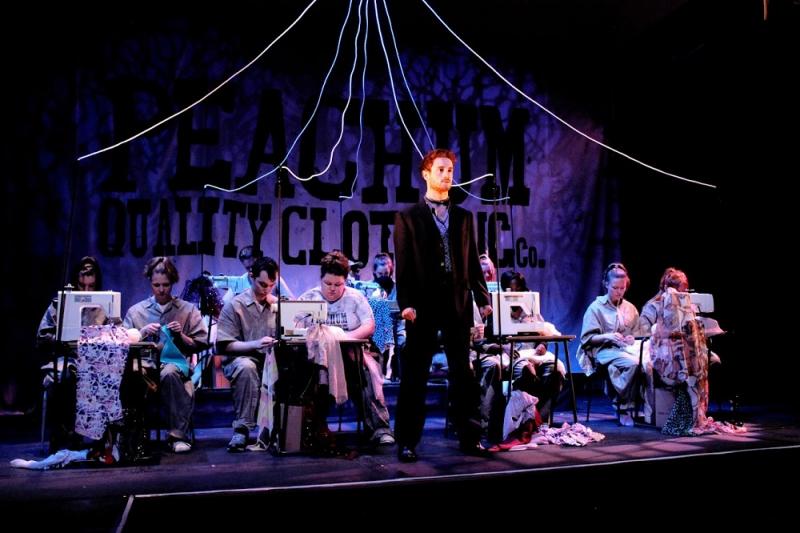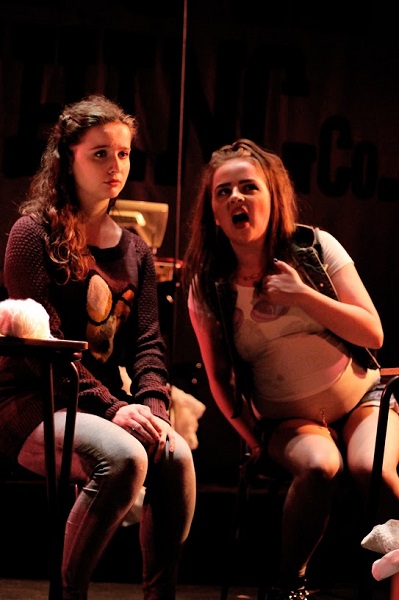The Beggar's Opera, University of Birmingham | reviews, news & interviews
The Beggar's Opera, University of Birmingham
The Beggar's Opera, University of Birmingham
Benjamin Britten meets Austerity Britain in a resourceful student production

Memo to self: never read the director’s programme essay.
And let's ignore, too, that “today’s working-class community”, far from being a rarity in opera, featured in recent productions of Sweeney Todd, Moses und Aron and Greek. And that Birmingham’s own internationally-renowned opera company has involved community members of all classes in productions ranging from Otello to Stockhausen’s Mittwoch aus Licht. As I say, Dorrell is young. And he’s far from alone in writing this sort of guff. Ignore it.
Because this is actually a smart, resourceful and entertaining student production of what is by any standards a difficult piece to bring off. Its once popular tunes and 18th century in-jokes don’t land on their own any more. A director needs to recreate a world in which the adventures of Polly, Macheath, Lockit and the rest can plausibly occur, and then charge these characters with sufficient raw life to make us care – all this with very little sustained singing. Britten’s 1948 reinvention of John Gay’s 1728 original gets you halfway there; its angular harmonies and grainy, silver and grey orchestrations already suggest an atmosphere of urban seediness.  Dorrell runs with it. Ambient industrial noises fill the auditorium pre-show, and the Beggar (Tom McCann) shuffles on through the audience in baseball cap and hoodie, dragging his sleeping bag behind him. Peachum is a small-time entrepreneur and the action takes place entirely amidst the hunched wage slaves of his backstreet sweatshop. There, we meet him (Matt Hayden), together with his wife – played as prime Northern battleaxe by Lydia Jane Haynes – their daughter Polly (the sweet-toned and wide-eyed Lizzie Lister, pictured right with Holly Singlehurst as Lucy), and in time, Gay’s whole Hogarthian carnival of Georgian low-life. Dorrell apparently wanted to “grunge up” the singing; this initially seemed to take the form of Haynes snarling the ends of phrases and Lister swooping up from under the note in TV talent-show style.
Dorrell runs with it. Ambient industrial noises fill the auditorium pre-show, and the Beggar (Tom McCann) shuffles on through the audience in baseball cap and hoodie, dragging his sleeping bag behind him. Peachum is a small-time entrepreneur and the action takes place entirely amidst the hunched wage slaves of his backstreet sweatshop. There, we meet him (Matt Hayden), together with his wife – played as prime Northern battleaxe by Lydia Jane Haynes – their daughter Polly (the sweet-toned and wide-eyed Lizzie Lister, pictured right with Holly Singlehurst as Lucy), and in time, Gay’s whole Hogarthian carnival of Georgian low-life. Dorrell apparently wanted to “grunge up” the singing; this initially seemed to take the form of Haynes snarling the ends of phrases and Lister swooping up from under the note in TV talent-show style.
But that mattered (and actually happened) less and less as the performance progressed, with the cast slipping back into their perfectly attractive natural singing voices – bright (and when required, powerful) in the case of Lucy (Holly Singlehurst, pealing out her high notes in a prosthetic baby bump while pouring bleach into a cocktail blender); eloquent and occasionally raw with indignation for Matthew McConnell as Macheath (easily the most sympathetic character alongside Sam Wilson’s Cockney thug of a Lockit and Daniel Scott’s wheedling Filch). Amongst the minor roles, Daisy Tudor’s Mrs Trapes whirled by in a flurry of pink feathers and chatter. Whoever was responsible for casting has a perceptive eye – and ear.
And it all bounded along vigorously, song flowing easily into speech, insults zinging through the air (“You pouting slut!”) and early problems of audibility and balance resolving themselves as the evening progressed, even if some cast members seemed more comfortable with spoken dialogue than others. The brief choral ensembles were alert and clear, and the small orchestra under Johannes David Wolff clearly enjoyed every wry bassoon solo and ominous percussion rumble of Britten’s remarkable score (the harp writing alone is a marvel of shadowy restraint). Dorrell’s final coup de théâtre (spoiler alert: Macheath’s reprieve backfires in macabre style) may have subverted Gay, but it seemed to fit remarkably well with Britten – and the evening as a whole. Given the context and the resources available, this Beggar’s Opera was a substantial achievement. Dorrell has something to say: just ignore his words, and let his theatre do the talking.
rating
Explore topics
Share this article
The future of Arts Journalism
You can stop theartsdesk.com closing!
We urgently need financing to survive. Our fundraising drive has thus far raised £49,000 but we need to reach £100,000 or we will be forced to close. Please contribute here: https://gofund.me/c3f6033d
And if you can forward this information to anyone who might assist, we’d be grateful.

Subscribe to theartsdesk.com
Thank you for continuing to read our work on theartsdesk.com. For unlimited access to every article in its entirety, including our archive of more than 15,000 pieces, we're asking for £5 per month or £40 per year. We feel it's a very good deal, and hope you do too.
To take a subscription now simply click here.
And if you're looking for that extra gift for a friend or family member, why not treat them to a theartsdesk.com gift subscription?
more Opera
 Carmen, English National Opera review - not quite dangerous
Hopes for Niamh O’Sullivan only partly fulfilled, though much good singing throughout
Carmen, English National Opera review - not quite dangerous
Hopes for Niamh O’Sullivan only partly fulfilled, though much good singing throughout
 Giustino, Linbury Theatre review - a stylish account of a slight opera
Gods, mortals and monsters do battle in Handel's charming drama
Giustino, Linbury Theatre review - a stylish account of a slight opera
Gods, mortals and monsters do battle in Handel's charming drama
 Susanna, Opera North review - hybrid staging of a Handel oratorio
Dance and signing complement outstanding singing in a story of virtue rewarded
Susanna, Opera North review - hybrid staging of a Handel oratorio
Dance and signing complement outstanding singing in a story of virtue rewarded
 Ariodante, Opéra Garnier, Paris review - a blast of Baroque beauty
A near-perfect night at the opera
Ariodante, Opéra Garnier, Paris review - a blast of Baroque beauty
A near-perfect night at the opera
 Cinderella/La Cenerentola, English National Opera review - the truth behind the tinsel
Appealing performances cut through hyperactive stagecraft
Cinderella/La Cenerentola, English National Opera review - the truth behind the tinsel
Appealing performances cut through hyperactive stagecraft
 Tosca, Royal Opera review - Ailyn Pérez steps in as the most vivid of divas
Jakub Hrůša’s multicoloured Puccini last night found a soprano to match
Tosca, Royal Opera review - Ailyn Pérez steps in as the most vivid of divas
Jakub Hrůša’s multicoloured Puccini last night found a soprano to match
 Tosca, Welsh National Opera review - a great company reduced to brilliance
The old warhorse made special by the basics
Tosca, Welsh National Opera review - a great company reduced to brilliance
The old warhorse made special by the basics
 BBC Proms: The Marriage of Figaro, Glyndebourne Festival review - merriment and menace
Strong Proms transfer for a robust and affecting show
BBC Proms: The Marriage of Figaro, Glyndebourne Festival review - merriment and menace
Strong Proms transfer for a robust and affecting show
 BBC Proms: Suor Angelica, LSO, Pappano review - earthly passion, heavenly grief
A Sister to remember blesses Puccini's convent tragedy
BBC Proms: Suor Angelica, LSO, Pappano review - earthly passion, heavenly grief
A Sister to remember blesses Puccini's convent tragedy
 Orpheus and Eurydice, Opera Queensland/SCO, Edinburgh International Festival 2025 review - dazzling, but distracting
Eye-popping acrobatics don’t always assist in Gluck’s quest for operatic truth
Orpheus and Eurydice, Opera Queensland/SCO, Edinburgh International Festival 2025 review - dazzling, but distracting
Eye-popping acrobatics don’t always assist in Gluck’s quest for operatic truth
 MARS, Irish National Opera review - silly space oddity with fun stretches
Cast, orchestra and production give Jennifer Walshe’s bold collage their all
MARS, Irish National Opera review - silly space oddity with fun stretches
Cast, orchestra and production give Jennifer Walshe’s bold collage their all
 Káťa Kabanová, Glyndebourne review - emotional concentration in a salle modulable
Janáček superbly done through or in spite of the symbolism
Káťa Kabanová, Glyndebourne review - emotional concentration in a salle modulable
Janáček superbly done through or in spite of the symbolism

Add comment